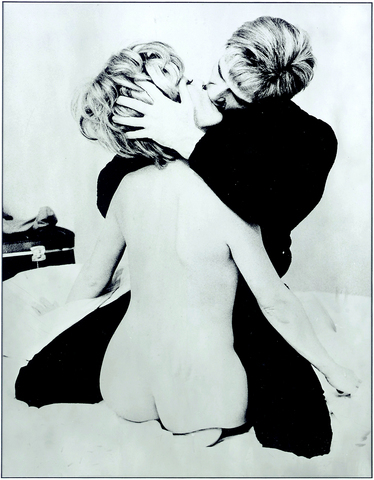A script of The Godfather annotated by Marlon Brando sold for a record US$312,800 at an auction of the late screen legend's personal effects at Christie's in New York.
The script of the 1972 classic, which won Brando a second best-actor Oscar for his portrayal of mafia kingpin Don Corleone, was the highlight of the sale, and attracted heavy bidding from the outset.
The lot was finally snapped up by a telephone bidder for more than 20 times its high estimate of US$15,000, setting a new world auction record for a script.

PHOTO: AP
The previous best was the US$244,000 paid for Clark Gable's Gone With the Wind script in 1996.
A handwritten letter from the creator of The Godfather, Mario Puzo, urging Brando to take the role of Don Corleone, also attracted strong bidding and finally sold for US$132,000, way above the Christie's high estimate of US$1,200.
"Dear Mr Brando, I wrote a book called The Godfather which has had some success and I think you're the only actor who can play the part," the signed letter began.
"I know this was presumptuous of me but the best I can do by the book is try. I really think you'd be tremendous," Puzo wrote.
The property going under the hammer Thursday comprised nearly 330 lots, most of them from the Los Angeles home where the increasingly reclusive actor lived from 1960 until his death in July 2004.
Christie's had promoted the auction as providing an intimate insight into the lifestyle of "an extremely private and elusive individual."
As well as souvenirs from Brando's lengthy screen career, many lots featured Brando's correspondence, both letters and telegrams, with fellow 20th-century icons like Marilyn Monroe and civil-rights leader Martin Luther King Jr, who wrote in 1959 asking for Brando's support in the fight to integrate US schools.
The King letter sold for US$13,200. Among the stranger items was a table football set that brought in US$5,400.
The run up to the auction had not been a smooth one with Brando's son Christian, 47, reportedly furious at the way Brando's estate has handled the sale.
Christian's lawyer, Theresa Bingham, said her client believed many of the lots in the auction were items that the actor would never have wanted sold.
Bingham specifically demanded that Christie's pull lot 150 -- a 14 carat gold Saint Christopher's medallion that Christian's mother, Anna Kashfi, had given her son.
The auction house confirmed before the sale that the heirloom had been returned.
Brando, who was married and divorced three times, had 11 children with his three wives and several other women, including his Guatemalan housekeeper.
Brando, who died last year of pulmonary fibrosis at the age of 80, revolutionized post World War II acting with his "method" portrayals of moody and raw but touching characters in films like Streetcar Named Desire (1951) and The Wild One (1953).
Despite his huge talent and global acclaim, many felt Brando never achieved his potential as an actor, preferring in his later life to dodge the spotlight and work only when he needed the cash, whatever the artistic merit of the film.

The canonical shot of an East Asian city is a night skyline studded with towering apartment and office buildings, bright with neon and plastic signage, a landscape of energy and modernity. Another classic image is the same city seen from above, in which identical apartment towers march across the city, spilling out over nearby geography, like stylized soldiers colonizing new territory in a board game. Densely populated dynamic conurbations of money, technological innovation and convenience, it is hard to see the cities of East Asia as what they truly are: necropolises. Why is this? The East Asian development model, with

June 16 to June 22 The following flyer appeared on the streets of Hsinchu on June 12, 1895: “Taipei has already fallen to the Japanese barbarians, who have brought great misery to our land and people. We heard that the Japanese occupiers will tax our gardens, our houses, our bodies, and even our chickens, dogs, cows and pigs. They wear their hair wild, carve their teeth, tattoo their foreheads, wear strange clothes and speak a strange language. How can we be ruled by such people?” Posted by civilian militia leader Wu Tang-hsing (吳湯興), it was a call to arms to retake

This is a deeply unsettling period in Taiwan. Uncertainties are everywhere while everyone waits for a small army of other shoes to drop on nearly every front. During challenging times, interesting political changes can happen, yet all three major political parties are beset with scandals, strife and self-inflicted wounds. As the ruling party, the Democratic Progressive Party (DPP) is held accountable for not only the challenges to the party, but also the nation. Taiwan is geopolitically and economically under threat. Domestically, the administration is under siege by the opposition-controlled legislature and growing discontent with what opponents characterize as arrogant, autocratic

When Lisa, 20, laces into her ultra-high heels for her shift at a strip club in Ukraine’s Kharkiv, she knows that aside from dancing, she will have to comfort traumatized soldiers. Since Russia’s 2022 invasion, exhausted troops are the main clientele of the Flash Dancers club in the center of the northeastern city, just 20 kilometers from Russian forces. For some customers, it provides an “escape” from the war, said Valerya Zavatska — a 25-year-old law graduate who runs the club with her mother, an ex-dancer. But many are not there just for the show. They “want to talk about what hurts,” she